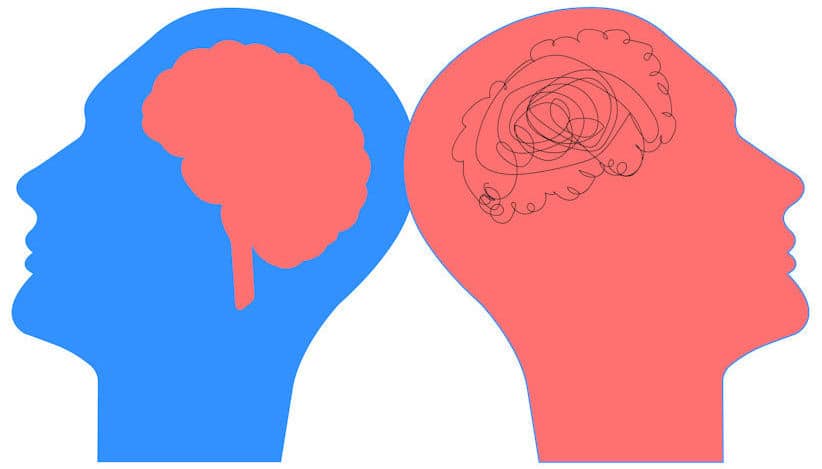Bipolar Disorder and Substance Abuse Treatment in Idaho
According to data from Mental Health America (MHA), at least 1 in every 40 adults in the United States has some form of bipolar disorder. This statistic is more than enough reason to consider consulting with a bipolar disorder treatment center to determine a diagnosis and to receive the necessary treatment from professionals. If left untreated, complications to health (physical and mental), relationships, and other important aspects of life will be compromised.
People with mental health conditions such as bipolar disorder are also immensely susceptible to developing a substance use disorder (SUD) if they have not already. Vice versa, substance abuse also leads to mental health issues.
At Eagle Creek Ranch Recovery in Nampa, Idaho, you’re not alone in your struggles. Our rehab facility specializes in providing dual diagnosis treatment for people suffering from bipolar disorder and substance abuse.

Bipolar disorder is a mental illness that causes unpredictable changes in a person’s mood, energy, activity levels, concentration, and ability to carry out day-to-day tasks. People diagnosed with bipolar disorder experience intense emotional states called mood episodes that usually occurs during distinct periods of days to weeks. These mood episodes are categorized as manic or hypomanic where the person was either in an abnormally happy or irritable mood, or depressive when they were in an uncharacteristically sad mood.
The type of mood swings manifested by people with bipolar disorder is usually accompanied by an extreme degree of behavior change. As said above, some individuals with a mood disorder or any mental issues can experience great difficulty with daily routines and social interactions. It’s not uncommon for people with bipolar disorder to have troubled relationships with loved ones and difficulties at work or school.
Contact Eagle Creek Ranch
Recovery Today!
Why Wait? Find The Help You Need By Reaching Out To Us Today! Our Admissions Team Is Standing By.
Signs and Symptoms of a Bipolar Disorder
Bipolar disorder encompasses a huge array of emotional and behavioral disorders, which is why mood episodes associated with the condition are typically classified into different types, including:
The manic type of bipolar disorder typically manifests feelings of heightened energy, creativity, and euphoria. People who experience a manic episode are described as being able to talk a mile a minute, sleep very little, and display hyperactive behavior. People experiencing a manic episode may also feel all-powerful, invincible, or destined for greatness, which is why they are viewed as severely delusional, narcissistic, and egotistical.
Mania, however, is also a danger to the person in that it could spiral out of control. People having a manic episode could behave recklessly, doing things like gambling away all their savings, engaging in inappropriate sexual activity, or engaging in ill-advised business investments. It is not uncommon for people in a manic episode to appear to be on a hair-trigger, easily becoming angry, irritable, and aggressive.
People in a manic state are known to pick fights, lash out at others despite being unprovoked, and go off on anyone who criticizes their behavior. There are even cases where the delusions affect their senses, with the person experiencing a manic episode claiming they hear voices telling them to do things.
Symptoms of mania include:
- Feeling an unusual emotional “high”
- Unreasonably optimistic
- Extremely irritable
- Grandiose beliefs about one’s abilities
- Feeling extremely energetic despite getting little sleep
- Talking so rapidly that they sound incoherent
- Uncontrolled racing thoughts
- Jumping quickly from one idea to the next
- Easily distracted
- Unable to concentrate or focus
- Impaired judgment
- Severe impulsiveness
- Reckless behavior
In severe cases, people experiencing a manic episode engage in highly dangerous or harmful behavior that they claim they were told to do, implying that they are already experiencing hallucinations.
Hypomania is similar to mania but to a lesser degree. In a hypomanic state, people will likely feel euphoric, energetic, and productive. These people could carry on with their day-to-day life without losing touch with reality. To people who do not know that the person is having a hypomania episode, the person would appear to simply be having a good day or merely be in an unusually good mood. Hypomania, however, could also impair a person’s judgment enough to influence the person to make bad decisions. Moreover, hypomania is known to escalate to full-blown mania, or conversely, could be followed by a major depressive episode.
Many mental health professionals initially lumped in bipolar depression with anxiety-driven depression, although studies today are suggesting that there are significant differences between the two conditions, which is often reflected in the recommended treatments for each one.
Perhaps the most pronounced difference between the two kinds of depression lies in the fact that antidepressants will not help most people with bipolar depression. There are even studies that suggest there is a risk that antidepressants can make bipolar disorder worse by escalating it to either mania or hypomania, with concurrent rapid cycling between mood states. Eagle Creek Recovery offers depression treatment in Idaho to help treat any type of depression anyone is suffering.
More differences between the two conditions could be seen in certain symptoms. Bipolar depression is more likely to involve irritability, guilt, unpredictable mood swings, and feelings of restlessness. Furthermore, a person with bipolar depression is more likely to develop psychotic depression, which is a condition where the person loses touch with reality. This is certain to cause major problems in work and social functioning, not to mention get to the point where it becomes an obvious danger to the person’s safety and well-being.
Symptoms of bipolar depression include:
- Feeling hopeless, sad, or empty
- Irritability
- Inability to experience pleasure
- Chronic fatigue
- Physical and mental sluggishness
- Significant appetite or weight changes
- Disruption of sleeping patterns
- Inability to concentrate
- Impaired memory
- Unwarranted feelings of worthlessness or guilt
- Thoughts of death or suicide
As the name suggests, some people experience symptoms of both mania or hypomania and depression. This state is an irony of sorts, as people experience symptoms of mania, such as impulsivity, irritability, and racing thoughts, and at the same time feel so low and melancholic as one would feel in the grip of an episode of depression. Mixed episodes are so confusing as it combines feelings of being sad and hopeless while feeling anxious, pressured, and energetic.
Research into bipolar disorder reveals that between 40% and 50% of people who are diagnosed with the condition will experience mixed episodes at some point in their lives. Mixed episodes present a critical danger to the person as the combination of high energy and low mood induces a severely confused state that increases the likelihood of suicide.
Symptoms of a Mixed Episode include:
- Depression combined with agitation
- Severe irritability
- Chronic feelings of anxiety
- Insomnia
- Inability to concentrate
- Racing thoughts
The Relationship Between Bipolar Disorder and Substance Abuse
Bipolar disorder and substance abuse commonly co-occur. Many people who have an addiction also have a mental health condition, such as bipolar disorder. Bipolar disorder, formerly known as “manic depression,” causes mood swings between intense emotional highs and lows. These episodes can last for several days or weeks. Bipolar disorder also causes significant fluctuations in energy and concentration.
Bipolar disorder can be caused by genetics and chemical imbalances in the brain. A traumatic environment can also increase the risk of bipolar disorder. This disorder can result in financial and legal difficulties, addiction, relationship problems, and suicide. Many people with bipolar disorder are tempted to use drugs to alleviate the symptoms of their condition.
A study of people with bipolar disorder found that roughly 60% had a history of substance abuse. Also, bipolar disorder patients who abuse drugs or alcohol have an earlier onset and a worse course of illness than those who do not. They are more likely to have irritable and dysphoric mood states, increased treatment resistance, and the need for hospitalization.
What is the Treatment for Bipolar Disorder and Substance Abuse?
Therapists will typically recommend one form of treatment or another to deal with most mental health issues, but in the case of bipolar disorder, most mental health professionals agree that the best form of treatment is a comprehensive mental health treatment, where several approaches are combined to address the many concerns that come with the condition.
A comprehensive treatment plan for bipolar disorder and substance abuse could include:
Medication is believed to be the cornerstone of bipolar disorder treatment. The massive mood swings are addressed with the prescription of mood stabilizing medications such as valproic acid, marketed as Depakote, where the mood swings are regulated to a level where the person is better able to manage how their behavior is affected by the sudden changes in their mood.
Lithium carbonate has also been seen to have a remarkable effect in reducing manic episodes, although physicians are still trying to isolate the exact mechanism of how this all works. Certain antiepileptic medications, such as lamotrigine (Lamictal) and carbamazepine (Equetro, Tegretol) are being explored for their effect on regulating bouts of depression, and to a lesser extent, mania or hypomania.
Therapy services are the most widely used approach in dealing with most forms of mental health issues and is also an essential method for dealing with bipolar disorder. Our effective treatment programs help a person learn how to cope with the more difficult or uncomfortable moods they experience.
With regular sessions, a person with bipolar disorder may begin to regulate their moods enough to repair disrupted relationships, manage the stress their condition brings, and regulate their behavior and negative habits.
Moods are not things that could be easily regulated, as the working mind is not attuned to predicting what particular mood will come at any given time. While many people might say that specific instances will bring a specific mood in them, people with bipolar disorder don’t have the luxury of saying the same. With the proper training that comes with therapy, a person may better deal with the symptoms and mitigate the complications that the condition brings.
Much like a person who is trying to keep sober, certain lifestyle regulations could help significantly in keeping mood fluctuations to a minimum, or at least to a manageable level. Certain lifestyles are known to bring elicit certain reactions in people, such as how people who binge drink could be surly and belligerent at times. By avoiding such lifestyle choices that could adversely affect the normal mood one would get, a person with bipolar disorder could steer away from instances that could make the condition much worse.
Certain lifestyle choices, such as maintaining a regular sleep schedule, avoiding alcohol and drugs, sticking to a healthy diet, and engaging in consistent exercise could minimize the stress that a person would experience daily. Many studies have established that minimizing daily stress goes a long way in helping people manage their difficulties, such as bipolar disorder. A good lifestyle management approach will also help prevent the worsening of the condition and prevent concurrent issues from developing, such as bipolar disorder and substance abuse.
Bipolar Disorder Could Be Effectively Managed. Let Eagle Creek Recovery Help You
The difficulty that comes with certain conditions often makes people think that there is no way to manage the symptoms or even lead a normal life outside of the disorder. We here at Eagle Creek Ranch Recovery in Nampa, ID, has helped countless people with their conditions, allowing them to lead better, fuller lives. We could help you with yours as well. Contact us today.

Clinical Director
Kendall Maloof is the clinical director at Eagle Creek Ranch Recovery. She is a licensed marriage and family therapist and has held multiple leadership roles before settling here at Eagle Creek. Kendall received her master’s degree in marriage and family therapy from the Chicago School of Professional Psychology in 2016. Her career in mental and behavioral health began in 2014 when she took up internships in both the nonprofit and for profit sectors. She interned at multiple reputable companies, such as The Living Success Center and 449 Recovery in California.
In 2019, Kendall became the clinical director of Sunsets Recovery for Woman, a dual diagnosis program in southern California. Kendall is a natural leader. She has an incredible ability to problem solve and stay calm in any situation. Kendall never fails to show up when she is needed, and her calm demeanor makes her team and clients feel at ease. Eagle Creek Ranch Recovery is proud to have Kendall as our clinical director.





